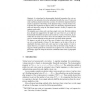Free Online Productivity Tools
i2Speak
i2Symbol
i2OCR
iTex2Img
iWeb2Print
iWeb2Shot
i2Type
iPdf2Split
iPdf2Merge
i2Bopomofo
i2Arabic
i2Style
i2Image
i2PDF
iLatex2Rtf
Sci2ools
81
Voted
ACNS
2005
Springer
2005
Springer
Non-interactive Zero-Knowledge Arguments for Voting
Abstract. In voting based on homomorphic threshold encryption, the voter encrypts his vote and sends it in to the authorities that tally the votes. If voters can send in arbitrary plaintexts then they can cheat. It is therefore important that they attach an argument of knowledge of the plaintext being a correctly formed vote. Typically, these arguments are honest verifier zero-knowledge arguments that are made non-interactive using the Fiat-Shamir heuristic. Security is argued in the random oracle model. The simplest case is where each voter has a single vote to cast. Practical solutions have already been suggested for the single vote case. However, as we shall see homomorphic threshold encryption can be used for a variety of elections, in particular there are many cases where voters can cast multiple votes at once. In these cases, it remains important to bring down the cost of the NIZK argument. We improve on state of the art in the case of limited votes, where each voter can vote a ...
| Added | 26 Jun 2010 |
| Updated | 26 Jun 2010 |
| Type | Conference |
| Year | 2005 |
| Where | ACNS |
| Authors | Jens Groth |
Comments (0)

